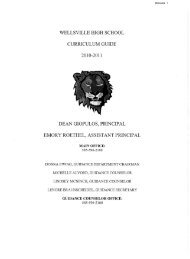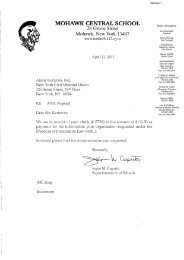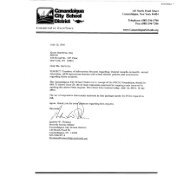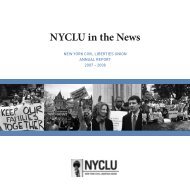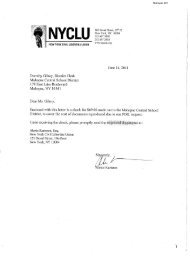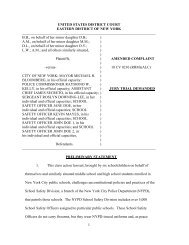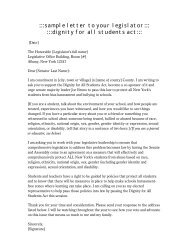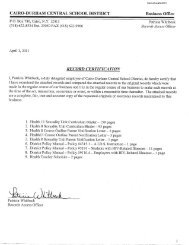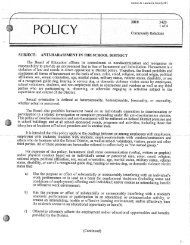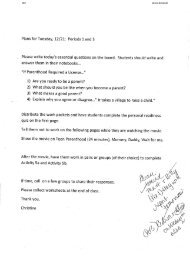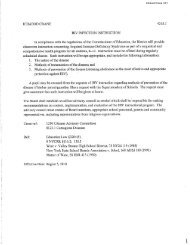Tabbaa v. Chertoff - New York Civil Liberties Union
Tabbaa v. Chertoff - New York Civil Liberties Union
Tabbaa v. Chertoff - New York Civil Liberties Union
Create successful ePaper yourself
Turn your PDF publications into a flip-book with our unique Google optimized e-Paper software.
UNITED STATES DISTRICT COURT<br />
EASTERN DISTRICT OF NEW YORK<br />
---------------------------------------------------------------x<br />
SAWSAAN TABBAA, HASSAN SHIBLY, :<br />
ASMAA ELSHINAWY, KAREMA ATASSI, :<br />
and GALEB RIZEK, :<br />
:<br />
Plaintiffs, : COMPLAINT<br />
:<br />
-versus- : 05 Civ.<br />
:<br />
MICHAEL CHERTOFF, Secretary of the United :<br />
States Department of Homeland Security; :<br />
ROBERT C. BONNER, Commissioner of the :<br />
United States Customs and Border Protection; :<br />
MICHAEL D’AMBROSIO, Director of Field :<br />
Operations in Buffalo, United States Customs :<br />
and Border Protection; and JOSEPH J. WILSON, :<br />
Buffalo Port Director for the United States :<br />
Customs and Border Protection, :<br />
:<br />
Defendants. :<br />
---------------------------------------------------------------x<br />
PRELIMINARY STATEMENT<br />
1. This civil-rights lawsuit seeks to vindicate the right of American citizens who are<br />
Muslim to attend religious conferences outside the country without being detained,<br />
interrogated, fingerprinted, and photographed upon their return to the United States<br />
simply for having attended these conferences. The United States Department of<br />
Homeland Security has implemented a policy or practice authorizing such actions and, as<br />
a result, the plaintiffs and dozens of other American citizens who are Muslim were<br />
unlawfully detained, interrogated, fingerprinted, and photographed near Buffalo, <strong>New</strong><br />
<strong>York</strong>, when they returned from a large Islamic conference that took place in Toronto,<br />
Canada in December 2004. The American citizens subjected to this mistreatment were<br />
1
singled out by federal border agents solely because they had attended an Islamic<br />
conference.<br />
2. The plaintiffs are five American citizens who are Muslim and who attended the<br />
December conference in Toronto for entirely lawful religious reasons. Traveling in four<br />
separate vehicles, the plaintiffs were detained at the Canadian-American border near<br />
Buffalo when border agents learned that they had attended the conference. Despite the<br />
fact that the plaintiffs were citizens and had valid American passports or other valid<br />
identification, they were held involuntarily for as long as six and one-half hours, were<br />
interrogated about the conference, and were fingerprinted and photographed. During the<br />
detentions, border agents confiscated cell phones when they learned that those being held<br />
were attempting to contact lawyers or the media. None of the plaintiffs had engaged in<br />
any unlawful conduct nor any other conduct that would justify the mistreatment to which<br />
they were subjected.<br />
3. The same religious conference is scheduled to take place again in December<br />
2005, and the plaintiffs all want to attend it but are reluctant to do so if they will be<br />
subjected to similar treatment. Moreover, all of them fear misuse by the federal<br />
government of the information, fingerprints, and photographs that the plaintiffs were<br />
forced to surrender. The government’s actions have had and will continue to have a<br />
substantial impact on the plaintiffs’ ability to exercise their lawful rights.<br />
4. The defendants’ actions violated the plaintiffs’ rights under the First and Fourth<br />
Amendments to the United States Constitution and under the Religious Freedom<br />
Restoration Act. The plaintiffs seek a declaration that the defendants’ actions were<br />
unlawful, a declaration that their policies and practices are unlawful, an injunction against<br />
2
further enforcement of those policies and practices, and an injunction requiring<br />
expungement from all federal databases of all information, fingerprints, and photographs<br />
unlawfully obtained from the plaintiffs.<br />
JURISDICTION AND VENUE<br />
5. This court has subject matter jurisdiction over the plaintiffs’ claims pursuant to<br />
28 U.S.C. §§ 1331, 1343(a)(4). Jurisdiction to grant declaratory judgment is conferred by<br />
28 U.S.C. §§ 2201, 2202. Injunctive relief is authorized by Rule 65 of the Federal Rules<br />
of <strong>Civil</strong> Procedure.<br />
6. Venue is proper in this action pursuant to 28 U.S.C. § 1391(e) in that at least one<br />
of the plaintiffs resides in the Eastern District of <strong>New</strong> <strong>York</strong>.<br />
PARTIES<br />
Plaintiffs<br />
7. SAWSAAN TABBAA is a United States citizen who is Muslim and resides in<br />
Amherst, <strong>New</strong> <strong>York</strong>.<br />
8. HASSAN SHIBLY is a United States citizen who is Muslim and resides in<br />
Amherst, <strong>New</strong> <strong>York</strong>.<br />
9. ASMAA ELSHINAWY is a United States citizen who is Muslim and resides in<br />
Brooklyn, <strong>New</strong> <strong>York</strong>.<br />
10. KAREMA ATASSI is a United States citizen who is Muslim and resides in<br />
Williamsville, <strong>New</strong> <strong>York</strong>.<br />
11. GALEB RIZEK is a United States citizen who is Muslim and resides in Niagara<br />
Falls, <strong>New</strong> <strong>York</strong>.<br />
3
Defendants<br />
12. MICHAEL CHERTOFF is the Secretary of the United States Department of<br />
Homeland Security (DHS) and has authority over all DHS policies, procedures, and<br />
practices relating to the entry of American citizens into the United States, including entry<br />
at border crossings near Buffalo, <strong>New</strong> <strong>York</strong>. Mr. <strong>Chertoff</strong> is sued in his official capacity.<br />
13. ROBERT C. BONNER is the Commissioner of the United States Customs and<br />
Border Protection (CBP), an agency within the United States Department of Homeland<br />
Security. In that capacity Mr. Bonner has authority over DHS policies, procedures, and<br />
practices relating to entry at border crossings into the United States, including entry at<br />
border crossings near Buffalo, <strong>New</strong> <strong>York</strong>. Mr. Bonner is sued in his official capacity.<br />
14. MICHAEL D’AMBROSIO is the director of field operations in Buffalo for the<br />
CBP. Upon information and belief, in that capacity Mr. D’Ambrosio has direct<br />
responsibility for and oversight over DHS policies, procedures, and practices relating to<br />
entry at the border crossings near Buffalo, <strong>New</strong> <strong>York</strong>. Mr. D’Ambrosio is sued in his<br />
official capacity<br />
15. JOSEPH J. WILSON is the Port Director in Buffalo for the CPB. Upon<br />
information and belief, in that capacity Mr. Wilson has direct responsibility for and<br />
oversight over DHS policies, procedures, and practices relating to entry at the border<br />
crossings near Buffalo, <strong>New</strong> <strong>York</strong>. Mr. Wilson is sued in his official capacity.<br />
4
FACTUAL ALLEGATIONS<br />
GENERAL ALLEGATIONS<br />
16. On three occasions since January 2003 a large religious conference known as the<br />
Reviving the Islamic Spirit (RIS) Conference has been held in Toronto, Canada.<br />
Organized by college students and considered to be the largest Islamic conference in<br />
Canada, the RIS Conference is a mainstream cultural and religious gathering that<br />
advocates peace, tolerance, and unity. It features speakers, includes religious activities,<br />
and has been endorsed by prominent politicians.<br />
17. The most recent RIS Conference took place in late December 2004 at a stadium<br />
in downtown Toronto called the Skydome. As in prior years, the Canadian government<br />
welcomed the December 2004 conference. Several Canadian officials addressed the<br />
conference, including the Premier of Ontario, Dalton McGuinty; Toronto Mayor David<br />
Miller; and Commissioner Giuliano Zaccardelli of the Royal Canadian Mounted Police.<br />
Premier McGuinty expressed his best wishes for an inspirational conference, stating, “I<br />
applaud the thousands of enthusiastic young people who have come together this<br />
weekend in a spirit of optimism to explore ways in which Muslim youth can make a<br />
difference in the life of their community—and make the world a better place.” The<br />
conference began with a call to prayer, and attendees prayed collectively on each day of<br />
the conference. On several occasions, attendees listened collectively to recitations from<br />
the Quran.<br />
18. Among the conference’s keynote speakers was Hamza Yusuf, an American<br />
citizen and prominent Imam from Hayward, California, who has advised President Bush<br />
5
on several occasions on matters regarding Islam. Mr. Yusuf sat near First Lady Laura<br />
Bush during President Bush’s September 20, 2001 address to a joint session of Congress.<br />
19. All of the plaintiffs attended the December 2004 RIS Conference. They did so to<br />
learn more about their religion and to participate in lectures by renowned Muslim<br />
scholars. Moreover, the plaintiffs attended the conference to congregate with and learn<br />
from other members of their faith and looked forward to associating with other Muslims<br />
at the conference. Some of the plaintiffs attended the conference to reaffirm their<br />
religious faith. One plaintiff considers her attendance at the annual conference her local<br />
“hajj,” or pilgrimage.<br />
20. The plaintiffs’ activities at the conference were entirely lawful, and nothing about<br />
those activities would provide any basis for suspecting the plaintiffs of unlawful conduct.<br />
21. As happened with dozens of other RIS Conference participants, when the<br />
plaintiffs arrived at the border near Buffalo, <strong>New</strong> <strong>York</strong> to return to the United States,<br />
agents of the United States Customs and Border Protection (CBP) singled them out when<br />
they learned of the plaintiffs’ attendance at the conference. Some who were wearing<br />
traditional Muslim clothing as they arrived at the border were asked about the conference<br />
before being asked any other question about their visit to Canada. In every instance,<br />
border agents told them they could not pass over the border and instead directed them<br />
into a nearby building, where dozens of other Muslim American citizens who had<br />
attended the conference were being detained.<br />
22. All five of the plaintiffs are American citizens. At the time they were detained,<br />
four of them had in their possession and provided to border agents valid United States<br />
passports; the fifth provided a valid <strong>New</strong> <strong>York</strong> State driver’s license, which was legally<br />
6
sufficient for entry into the United States. Nothing about the plaintiffs’ identification<br />
would provide any reasonable basis for believing or suspecting that the documents were<br />
invalid or falsified. Upon information and belief, border agents had no reason to doubt<br />
that the plaintiffs were United States citizens when they detained them.<br />
23. The plaintiffs were detained for many hours in a room that was cold and lacked<br />
adequate seating. Several children who were detained cried about their hands turning<br />
blue from the cold and from watching their parents and siblings being subjected to<br />
humiliating interrogations and being taken away by armed federal agents.<br />
24. During their detention, the plaintiffs and others were interrogated about the<br />
conference. They were asked questions such as: What was the conference about? What<br />
did you do at the conference? Why did you attend the conference? What did the<br />
speakers discuss? Did anyone ask you to harm Americans? At no time during their<br />
detention were the plaintiffs asked questions bearing on their citizenship.<br />
25. As they realized what was happening to them, some of the plaintiffs attempted to<br />
use their cell phones to contact attorneys, the media, or family members to tell them<br />
about their detention. When border agents learned of this, they prohibited such calls, and<br />
border agents seized cellular phones from several of the plaintiffs.<br />
26. Following the interrogations, border agents moved the plaintiffs to separate<br />
rooms to be frisked. Agents forced several of the plaintiffs to turn around, put their hands<br />
on the wall, and kicked their feet wide open -- almost knocking over one of the plaintiffs<br />
-- as agents patted them down. One female plaintiff was asked to remove her hijab -- a<br />
traditional Muslim headscarf -- and when she refused an agent inserted her fingers under<br />
the hijab and searched around the woman’s head and behind her ears.<br />
7
27. Next, federal agents digitally fingerprinted the plaintiffs. Some refused to be<br />
fingerprinted, but the agents told them that they had no choice. One plaintiff cried<br />
throughout the experience as an agent roughly grabbed her hand and forced her to submit<br />
to the fingerprinting. The agents refused to explain why they were fingerprinting the<br />
plaintiffs.<br />
28. Following the fingerprinting, the agents digitally photographed the plaintiffs.<br />
29. After subjecting the plaintiffs to this involuntary detention, interrogation,<br />
frisking, fingerprinting, and photographing, border agents released them.<br />
30. When plaintiffs returned to their vehicles, they found that the vehicles had been<br />
searched.<br />
31. Border agents do not routinely detain interrogate, frisk, fingerprint, or photograph<br />
United States citizens returning to this country. The plaintiffs did not consent to being<br />
detained, interrogated, fingerprinted or photographed.<br />
32. Upon information and belief, the interrogation, frisking, fingerprinting, and<br />
photographing of the plaintiffs was not intended to or reasonably likely to produce<br />
information relevant to ascertaining whether the plaintiffs were citizens. At no time<br />
during the detention of the plaintiffs did border agents have any basis for believing that<br />
the plaintiffs were not citizens. All of the plaintiffs were detained substantially longer<br />
than necessary to ascertain their citizenship had there been any reasonable doubt about<br />
their citizenship.<br />
33. At no time did any reasonable basis exist to believe that any of the plaintiffs were<br />
seeking to bring into the country any unauthorized items. Upon information and belief,<br />
nothing about the detention, interrogation, fingerprinting, or photographing of the<br />
8
plaintiffs was intended or reasonably likely to produce any information about whether the<br />
plaintiffs were seeking to bring into the country any unauthorized items.<br />
34. Upon information and belief, defendants created and maintain records in CBP<br />
and other databases regarding the plaintiffs’ December 2004 Buffalo border-crossings,<br />
including records of plaintiffs’ fingerprints and photographs.<br />
35. A considerable public controversy arose when the government’s actions came to<br />
light. According to media accounts, Department of Homeland Security spokesperson<br />
Kristie Clemens stated that DHS agents had detained anyone who said they attended the<br />
RIS Conference. She sought to justify the government’s actions by stating that<br />
“conferences such as the one that these 34 individuals just left in Toronto may be used by<br />
terrorist organizations to promote terrorist activities.” In other reported remarks Ms.<br />
Clemens stated that DHS believed that future similar conferences will be used for similar<br />
purposes.<br />
36. During a meeting between local community leaders and Buffalo area DHS<br />
officials about the government’s treatment of those returning from the RIS Conference,<br />
DHS officials stated that the detentions, interrogations, fingerprinting, and photographing<br />
resulted from a directive from DHS headquarters in Washington, D.C. In response to<br />
questions about whether such actions will be repeated, DHS officials have refused to<br />
answer the question or have said that they could make no assurances that such actions<br />
will not be repeated.<br />
37. These statements and actions by high-level DHS officials are consistent with<br />
statements made by border agents to the plaintiffs indicating that the agents were<br />
following orders from their supervisors. Agents told the plaintiffs that they were waiting<br />
9
for clearance calls from their superiors, that their supervisors ordered them to detain<br />
“certain people,” and that higher authorities were forcing them to keep plaintiffs in<br />
detention. One plaintiff was told that “this is a new system” and that “you’re going to be<br />
seeing this at the border.”<br />
38. The next RIS Conference is scheduled to take place in December 2005. All of<br />
the plaintiffs wish to attend that conference but fear that they will be detained,<br />
interrogated about their participation in the conference, fingerprinted, and photographed<br />
solely because of their attendance at the conference. The plaintiffs also are concerned<br />
about what the government has done or intends to do with the information, fingerprints,<br />
and photographs it has obtained and that it may obtain if the plaintiffs attend future<br />
conferences. If they were to attend the conference, the plaintiffs likely would pass<br />
through border crossings in the Buffalo area.<br />
39. Upon information and belief, the defendants have authorized and have in place a<br />
policy or practice of detaining, interrogating, fingerprinting, and photographing American<br />
citizens who are Muslim and who are returning from Muslim religious conferences<br />
outside the United States. All of the plaintiffs were subjected to this policy or practice in<br />
December 2004 and, because they intend to attend such conferences in the future, all of<br />
the plaintiffs are at risk of being subjected to this policy and practice in the future.<br />
40. The defendants’ actions have been taken under the color of law.<br />
INDIVIDUAL PLAINTIFFS<br />
Sawsan <strong>Tabbaa</strong> and Hassan Shibly<br />
41. Plaintiff SAWSAN TABBAA is a United States citizen who works as a clinical<br />
assistant instructor of orthodontics at the SUNY University at Buffalo Dental School.<br />
10
Her son, plaintiff HASSAN SHIBLY, is an 18-year-old United States citizen who is a<br />
political science major at the SUNY University at Buffalo.<br />
42. Ms. <strong>Tabbaa</strong>, Mr. Shibly, and Ms. <strong>Tabbaa</strong>’s other three children attended the RIS<br />
Conference in December 2004. Ms. <strong>Tabbaa</strong> considers the conference her local hajj, or<br />
pilgrimage. She looks forward to the opportunity to meet other people who share a<br />
similar culture and faith. Mr. Shibly attended to learn more about Islam, to contribute to<br />
Muslim unity, and to learn more about cultural dialogue between Muslims and members<br />
of other religious faiths. Ms. <strong>Tabbaa</strong> and Mr. Shibly also attended the previous two RIS<br />
conferences.<br />
43. The <strong>Tabbaa</strong> family arrived at the border after midnight on December 27, with<br />
Ms. <strong>Tabbaa</strong> and her daughter wearing a hijab, as is their religious custom. They each had<br />
valid United States passports, which an agent asked for and they provided. The CBP<br />
agent then asked why they were in Canada, and Mr. Shibly replied that the family<br />
attended the RIS Conference. The agent told them they had all been selected for a<br />
random inspection and ordered them to park their car and wait in a nearby building.<br />
44. Upon entering the building, the family was shocked to see several Muslim<br />
families who had attended the RIS Conference, including friends who had left Toronto<br />
four hours before them. They saw an elderly couple with their two young children<br />
sleeping in their arms, several babies, and a pregnant woman who looked very pale and<br />
had swollen eyes. The <strong>Tabbaa</strong> family also saw several families who attend their mosque.<br />
45. Mr. Shibly complained to agents that they were selectively targeting Muslims<br />
who attended the conference and that the detentions were clearly not random. When he<br />
complained that some of his friends had already been in detention for four hours, an agent<br />
11
esponded, “Well, maybe you’ll be here for eight hours.” Another agent told him to stop<br />
complaining because she was just following orders from her supervisors.<br />
46. Mr. Shibly asked permission to take photographs in order to document the<br />
detentions. The agent told Mr. Shibly “absolutely not.”<br />
47. Out of desperation and fear, Mr. Shibly attempted to contact the media for help.<br />
He placed several phone calls from his cellular phone until a border agent requested that<br />
Mr. Shibly place his phone calls outside the building. After realizing that he was<br />
contacting the media, the agent then ordered Mr. Shibly not to use his telephone. Shortly<br />
thereafter, agents prohibited all detainees from making any phone calls.<br />
48. Ms. <strong>Tabbaa</strong>’s three-year-old daughter was awake though the night crying. Her<br />
hands turned blue because of the cold.<br />
49. After the family waited anxiously for several hours, agents ordered the family to<br />
complete some forms. Agents then directed Mr. Shibly to an isolated room with two<br />
armed guards, who ordered Mr. Shibly to empty his pockets. The agents turned Mr.<br />
Shibly to face the wall and kicked his legs open so forcefully that Mr. Shibly almost fell<br />
to the ground. The agents administered a pat-down search.<br />
50. After the degrading search, agents took Mr. Shibly to be fingerprinted and<br />
photographed. He protested that he was not a criminal and did not want to be<br />
fingerprinted or photographed, but the agents ordered Mr. Shibly to cooperate and<br />
forcefully took Mr. Shibly’s hand for a digital scan of his fingerprints. Mr. Shibly told<br />
the officers that he felt humiliated and degraded.<br />
51. Agents then ordered Ms. <strong>Tabbaa</strong> to provide her fingerprints. Ms. <strong>Tabbaa</strong><br />
peacefully refused, stating that she wanted to leave the detention center and go home.<br />
12
She said that she did not want to be fingerprinted unless the agents had some reason to<br />
suspect her of a crime. The agents told her that she could not leave unless she submitted<br />
to being fingerprinted. An agent said that if she tried to leave the agent would track her<br />
down and she would be placed in a holding cell.<br />
52. Afraid that the agents would hurt her family, Ms. <strong>Tabbaa</strong> agreed to follow the<br />
agents into a separate room to be fingerprinted. Ms. <strong>Tabbaa</strong>’s youngest daughter was<br />
frightened and crying and would not let go of her mother. Ms. <strong>Tabbaa</strong> cried as well as<br />
agents forcibly separated her from her daughter.<br />
53. Once inside the fingerprinting room, Ms. <strong>Tabbaa</strong> again protested to the agents in<br />
the room that she did not wish to be fingerprinted. An agent then seized Ms. <strong>Tabbaa</strong>’s<br />
hand and forced her to be fingerprinted. Ms. <strong>Tabbaa</strong> pleaded with the agent, stating “I<br />
don’t want to do this, this is humiliating,” but the agent would not let go of her hands.<br />
Ms. <strong>Tabbaa</strong> cried.<br />
54. Ms. <strong>Tabbaa</strong> asked an agent if she was being detained because she had attended<br />
the RIS Conference. The agent replied, “If I tell you, I’ll lose my job.” Another agent<br />
told her to stop asking questions because “you have no rights at the border.”<br />
55. At approximately 5:30 a.m., after detaining them for approximately three and<br />
one-half hours, border agents released Ms. <strong>Tabbaa</strong>, Mr. Shibly, and their family.<br />
56. Ms. <strong>Tabbaa</strong> and Mr. Shibly want to attend future RIS conferences, but they are<br />
worried about being subjected to the same degrading treatment. Mr. Shibly does not<br />
want to sacrifice his right to attend the conference because of the government’s actions.<br />
57. Ms. <strong>Tabbaa</strong> and Mr. Shibly are both very concerned about the government’s use<br />
of the information it obtained during the interrogations and detention. They are worried<br />
13
that the government maintains files about them and their family members who attended<br />
the religious conference, that the information was shared with other government<br />
agencies, such as the FBI, and that they will be singled out again by the government in<br />
the future.<br />
Asmaa Elshinawy<br />
58. Plaintiff ASMAA ELSHINAWY is a 20-year-old United States citizen who is a<br />
teaching assistant at an early childhood center. Ms. Elshinawy attended the December<br />
2004 RIS Conference to learn more about her religion. It was her first time attending the<br />
RIS Conference.<br />
59. Ms. Elshinawy left the conference in a car with five girlfriends and arrived at a<br />
Buffalo area border crossing late in the afternoon of December 27. A CBP agent asked<br />
them if they were United States citizens. They all replied yes, and the agent asked for<br />
their passports. Ms. Elshinawy and her friends all provided valid U.S. passports to the<br />
agent. Although the women had not yet mentioned their reasons for visiting Canada, the<br />
agent asked the women if they had been “at the conference.” When they replied that they<br />
had, the agent ordered them to pull the car over. One of Ms. Elshinawy’s friends asked<br />
why they were being pulled over, but the agent would not respond.<br />
60. While she and her friends were detained in a building for hours, Ms. Elshinawy<br />
noticed that others who appeared not to be Muslim were passing in and out of the<br />
building without difficulty and that agents were apologizing to them for the delay even<br />
though they had not been held for nearly as long as Ms. Elshinawy and other Muslimlooking<br />
people had been held.<br />
14
61. After several hours of detention, an agent asked Ms. Elshinawy and her friends<br />
why they had attended the RIS Conference. One of Ms. Elshinawy’s friends responded<br />
that they attended to learn more about improving the image of Islam in North America.<br />
The agent replied with disbelief and insinuated that they were not telling the truth.<br />
62. Agents interrogated Ms. Elshinawy and some of her friends about their<br />
participation in the RIS Conference, including what the they had done at the conference,<br />
why they had attended the conference, what had happened at the conference, and what<br />
the speeches were about.<br />
63. Agents required Ms. Elshinawy and her friends to surrender their cellular phones.<br />
64. Eventually, agents called Ms. Elshinawy into a private room. An agent<br />
administered a pat-down search and asked if Ms. Elshinawy had any weapons hidden in<br />
her undergarments. Ms. Elshinawy replied that she did not. She was embarrassed and<br />
offended by this question and felt that the government had labeled her a criminal because<br />
she is Muslim.<br />
65. Ms. Elshinawy was then directed to a different room to be digitally fingerprinted<br />
and photographed. Ms. Elshinawy protested that she did not want to be fingerprinted or<br />
photographed. Agents informed her that she had no choice and said that it was “standard<br />
procedure.”<br />
66. Ms. Elshinawy and her friends were finally released at approximately 9:00 p.m.<br />
on December 27. When Ms. Elshinawy and the others arrived back at the car, they found<br />
it in disarray. A video camera they had in the car was open and on its side, and seemed to<br />
have been viewed. A friend of Ms. Elshinawy’s was concerned that border agents had<br />
15
watched the video footage, which contained images of the vehicle occupants without<br />
their hijabs on. They complained to a supervisor about the condition of the car.<br />
67. Ms. Elshinawy wants to attend future RIS conferences. She is afraid, however,<br />
that government officials will again detain and harass her if she attends the conference.<br />
She also is concerned that the government has information about her, including her<br />
fingerprints and photographs and that that information may now be in government<br />
databases or on government lists.<br />
Karema Atassi<br />
68. Plaintiff KAREMA ATASSI is a 22-year-old United States citizen who is a<br />
graduate student at the SUNY University at Buffalo studying school counseling. Ms.<br />
Atassi attended the RIS Conference to hear from the many respected Muslim scholars at<br />
the conference and to learn more about her religion. Ms. Atassi also looked forward to<br />
associating with other Muslims. She attended the conference with her husband, Tamer<br />
Osman; her mother, brother, infant son, and a friend. Ms. Atassi also attended the RIS<br />
conference in January 2004.<br />
69. After the conference ended on December 26, 2004, Ms. Atassi and her family left<br />
Toronto late in the day to drive back to their home in Williamsville, <strong>New</strong> <strong>York</strong>. They<br />
arrived at a Buffalo area border crossing at approximately 11:30 p.m. As is her religious<br />
custom, Ms. Atassi wore a hijab; Mr. Osman wore a kufi, a traditional Muslim hat.<br />
70. When Ms. Atassi and her family arrived at the border, they had in their possession<br />
their valid United States passports, which they provided to a CBP agent who asked them<br />
their reason for visiting Canada. Mr. Osman, who was driving the family minivan,<br />
replied that they were returning from “an Islamic conference.” The agent asked whether<br />
16
the conference was the one “at the Skydome?” When Ms. Atassi and her family<br />
confirmed that they had been at the RIS Conference in Toronto, the agent ordered them to<br />
pull over and to report to a nearby building. The agent seized the family’s passports.<br />
71. Inside the building, Ms. Atassi noticed that a large number of the people being<br />
detained appeared to be Muslim. Some of them told her that many Muslims had been<br />
detained earlier and had just been released.<br />
72. Agents refused to explain to Ms. Atassi why she and her family were being held<br />
and what would happen to them, even though the family repeatedly asked for an<br />
explanation. Ms. Atassi’s brother wanted to call family members to tell them that the<br />
family had been detained, but agents prohibited him from using his cellular phone. As<br />
the family’s fear grew, the brother attempted to contact a lawyer. Again, an agent<br />
forbade him from making any such contact.<br />
73. Ms. Atassi grew frustrated and angry as the night progressed. Some of the agents<br />
scared her and told her, “Don’t you know that you have no rights at the border?” Several<br />
agents told her that higher authorities were forcing them to keep the family in detention.<br />
A supervisor admitted to Ms. Atassi that she and her family were not being detained<br />
pursuant to a random selection. Another agent informed her husband that CBP had a new<br />
policy of fingerprinting people like them.<br />
74. After being detained for several hours and then being asked to complete some<br />
forms, Ms. Atassi and her family were interrogated. Agents asked family members how<br />
they knew each other and why had they traveled in the past to certain Middle Eastern<br />
countries Agents then separated Mr. Osman from the rest of the family and interrogated<br />
him individually. They asked him about the nature and content of the RIS Conference<br />
17
and demanded to know whether anyone had asked him to harm Americans. The family<br />
was humiliated and offended by the suggestion that they were terrorists or criminals.<br />
75. After the interrogation, agents took Ms. Atassi to a separate room to be frisked.<br />
Agents then digitally fingerprinted and photographed her. Ms. Atassi did not want to be<br />
searched, fingerprinted, or photographed, but she felt that she had no choice. She was<br />
scared and intimidated. It was clear to her that she would be arrested if she refused.<br />
76. After approximately five hours in detention, Ms. Atassi and her family were<br />
released. By the time they were allowed to leave, it was approximately 4:30 in the<br />
morning.<br />
77. Ms. Atassi would like to attend future RIS conferences. She fears, however, that<br />
she will be detained, interrogated, fingerprinted and photographed once again. On the<br />
other hand, she wants to be able to learn more about her religion.<br />
78. Ms. Atassi is worried about what will happen with the information obtained by<br />
the government during the detention.<br />
Galeb Rizek<br />
79. Plaintiff GALEB RIZEK is a 33-year-old United States citizen who is the general<br />
manager of a hotel in Niagara Falls, <strong>New</strong> <strong>York</strong>. He attended the December 2004 RIS<br />
Conference because he wanted to learn more about his religion and to ask questions of<br />
Muslim scholars.<br />
80. Mr. Rizek left Toronto after the conference ended on December 26 with his<br />
brother and uncle. They arrived at a Buffalo area border crossing just before midnight.<br />
A CBP agent asked for identification, and Mr. Rizek provided his valid <strong>New</strong> <strong>York</strong> State<br />
driver’s license. Mr. Rizek works in the travel industry and crosses the border frequently<br />
18
with his driver’s license and has not previously encountered any problems. The agent<br />
then asked where in Canada Mr. Rizek had visited. When he responded that they had<br />
been in Toronto, the agent asked, “Did you go to the conference?” Mr. Rizek said yes,<br />
and the agent seized his driver’s license and ordered Mr. Rizek to report to a nearby<br />
building.<br />
81. Mr. Rizek was astonished to see so many Muslim attendees of the RIS<br />
Conference in the detention center, including other members of his family who had been<br />
traveling in another car. Mr. Rizek was particularly surprised because he knew that most<br />
of the Muslims he recognized were U.S. citizens.<br />
82. About the detentions, a supervisor told Mr. Rizek that they were carrying out<br />
orders from above. Another agent said, “This is a new system,” and suggested it was a<br />
pilot program that had been used in airports. The agent said, “You’re going to be seeing<br />
this at the border.”<br />
83. Agents prohibited Mr. Rizek and the other detainees from using their cellular<br />
phones.<br />
84. Mr. Rizek’s sister, who had returned from the conference in a separate car and<br />
was seven months pregnant, was also in detention. At one point during the night, agents<br />
ordered her to lift her shirt to prove that she was pregnant.<br />
85. After agents eventually ordered him to fill out some forms, an agent interrogated<br />
Mr. Rizek, asking questions such as: Where did you go? What did you do? Did anyone<br />
ask you to donate money? The agent also asked if anyone tried to recruit him for terrorist<br />
activity. Mr. Rizek replied, “No.”<br />
19
86. During his interrogation, Mr. Rizek asked the agent if he had done anything<br />
wrong or if he was under arrest. The agent responded that he was only following<br />
procedure. Mr. Rizek asked if the agent does this to everyone who crosses the border.<br />
The agent initially responded, “No,” but after receiving a strange look from another CBP<br />
agent, he changed his answer to “Yes.”<br />
87. After the interrogation, the agents forced Mr. Rizek to stand up, remove his coat,<br />
and place his hands on the wall. The agents kicked his feet open and administered a patdown<br />
search.<br />
88. Agents then told Mr. Rizek that he would be fingerprinted. Mr. Rizek protested<br />
that he was not comfortable giving his fingerprints. An agent replied that he would stay<br />
in indefinite detention until he agreed to be fingerprinted. The agents then fingerprinted<br />
and photographed Mr. Rizek.<br />
89. At approximately 5:30 a.m., Mr. Rizek’s car keys were taken and his car was<br />
searched. At approximately 6:30 a.m. and after approximately six and one-half hours of<br />
detention, Mr. Rizek was released.<br />
90. Mr. Rizek wants to attend the RIS Conference again in the future, but he is very<br />
worried about being subjected to the same treatment and that is substantially affecting his<br />
willingness to attend future conferences.<br />
91. Mr. Rizek is anxious about what will happen to the records obtained by the<br />
government during his interrogation, fingerprinting, and photographing. He worries that<br />
the information was placed in a government database and shared with other government<br />
agencies.<br />
20
92. Approximately one month after his border detention, Mr. Rizek crossed the<br />
border into Canada again. On that occasion, Mr. Rizek provided his identification to the<br />
border agent, the agent looked back at him and asked whether he had been pulled over a<br />
few weeks earlier. The agent then took out a newspaper clipping about the December<br />
2004 border detention incident. After Mr. Rizek responded that he was that individual,<br />
the border agent waved him through and said, “You get out of here now.”<br />
CAUSES OF ACTION<br />
FIRST CAUSE OF ACTION<br />
93. The defendants’ actions violated the plaintiffs’ right of freedom of religion under<br />
the First Amendment to the United States Constitution.<br />
SECOND CAUSE OF ACTION<br />
94. The defendants’ actions violated the plaintiffs’ rights of free speech and assembly<br />
under the First Amendment to the United States Constitution.<br />
THIRD CAUSE OF ACTION<br />
95. The defendants’ actions violated the plaintiffs’ rights to be free from<br />
unreasonable searches and seizures under the Fourth Amendment to the United States<br />
Constitution.<br />
21
FOURTH CAUSE OF ACTION<br />
96. The defendants’ actions violated the plaintiffs’ rights under the Religious<br />
Freedom Restoration Act, 42 U.S.C. § 2000bb et seq.<br />
WHEREFORE the plaintiffs respectfully request that the Court:<br />
1) Assume jurisdiction over this matter;<br />
2) Declare that the defendants have violated the plaintiffs’ rights under the First<br />
and Fourth Amendments to the United States Constitution and under the<br />
Religious Freedom Restoration Act;<br />
3) Enjoin the defendants from detaining, interrogating, fingerprinting, and<br />
photographing United States citizens who are Muslim because they are<br />
returning to the country after having attended religious conferences;<br />
4) Order the defendants to return all information, fingerprints, and photographs<br />
unlawfully obtained from the plaintiffs and to expunge from government<br />
databases or otherwise destroy any information, fingerprints, or photographs<br />
that cannot be returned;<br />
5) Award the plaintiffs reasonable attorneys’ fees and costs; and<br />
6) Grant any other relief the court deems appropriate.<br />
Respectfully submitted,<br />
NEW YORK CIVIL LIBERTIES UNION<br />
FOUNDATION, by<br />
___________________________<br />
CHRISTOPHER DUNN (CD 3991)<br />
UDI OFER<br />
ARTHUR EISENBERG (AE 2012)<br />
DONNA LIEBERMAN (DL 1268)<br />
<strong>New</strong> <strong>York</strong> <strong>Civil</strong> <strong>Liberties</strong> <strong>Union</strong> Foundation<br />
125 Broad Street, 17th Floor<br />
<strong>New</strong> <strong>York</strong>, N.Y. 10004<br />
(212) 344-3005<br />
22
CATHERINE KIM<br />
COREY STOUGHTON<br />
American <strong>Civil</strong> <strong>Liberties</strong> <strong>Union</strong><br />
125 Broad Street, 18th Floor<br />
<strong>New</strong> <strong>York</strong>, N.Y. 10004<br />
(212) 549-2500<br />
ARSALAN IFTIKHAR<br />
KHURRUM WAHID (KW 9149)<br />
Council on American-Islamic Relations<br />
453 <strong>New</strong> Jersey Ave, SE<br />
Washington, D.C. 20003<br />
(202) 488-8787<br />
MICHAEL WISHNIE (MW 1952)<br />
245 Sullivan Street, 5 th Floor<br />
<strong>New</strong> <strong>York</strong>, N.Y. 10012<br />
(212) 998-6430<br />
NYCLU Cooperating Attorney<br />
Dated: <strong>New</strong> <strong>York</strong>, N.Y.<br />
April 20, 2005<br />
23



